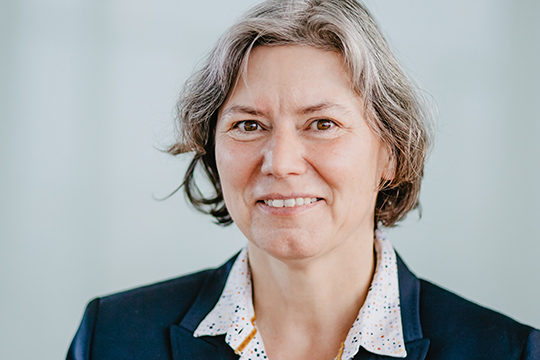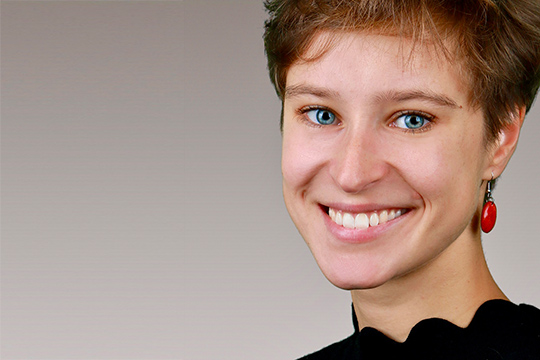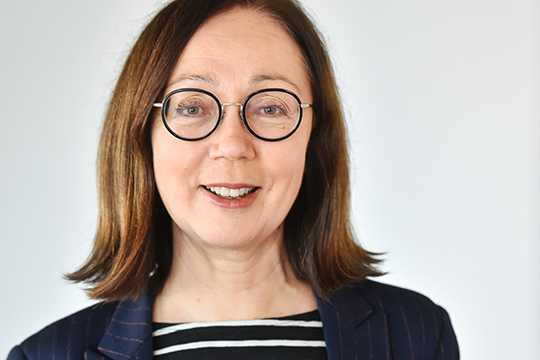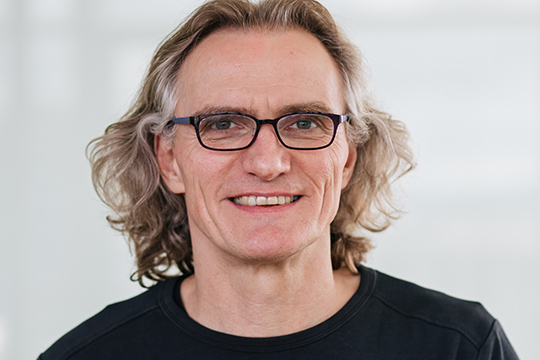“The System is Sick”
Freiburg, Jul 15, 2021
Researchers have been discussing limited contracts, personal and career uncertainty, and a lack of perspectives on social media for a few weeks. Under the hashtag #IchBinHanna, they have pointed out and criticized unattractive working and employment conditions in academia. In light of this and earlier debates, it has again become apparent that universities need to devote attention and further develop career opportunities for their academic and research staff. Under the auspices of "Freiburg Career Advancement," the University of Freiburg posts job offerings from different institutions and departments that are involved in career development. Since April 2021, academic career and professional development have been incorporated in the responsibilities of a vice president at the university. A discussion series in a range of formats will raise awareness of the issue at the University of Freiburg (see Infobox below). Annette Kollefrath-Persch and Rimma Gerenstein spoke with six members of the university community about these issues. The interviewees express various viewpoints, experiences, and possible solutions. In a virtual roundtable, university administration leaders – Rector Prof. Dr. Kerstin Krieglstein, Vice President for University Culture Prof. Dr. Sylvia Paletschek, and Vice President for Research and Innovation Prof. Dr. Stefan Rensing, exchanged thoughts with political scientist and postdoctoral candidate Dr. Julia Gurol, the Spokeswoman of the Joint Working Committee of the Doctoral Candidate Councils Klara Lesch, and Oliver Trachte of the Staff Council of the University of Freiburg.

Researchers and university administrators complain that the balance between third party and basic funding has become increasingly skewed over the years. Photo: Harald Neumann
Most of those studying at an institution of higher education are there to obtain a degree that qualifies them for a career, rather than to pursue a career in academia. The subsequent doctoral degree can also be considered a necessary and desirable qualification for many professional positions. After that, things become differentiated. After about two years of postdoctoral work, people begin to concentrate increasingly on an academic career, and the areas of employment – both within and outside of the university – become increasingly scarce. Therefore, we need free choices for qualifications. Everyone who would like a doctorate and is a suitable candidate, must receive a place. During this phase, students have the freedom qualify, but not an educational background that could potentially lead to a dead end.
 “If we really want to change something, then we have to restructure the academic and research system in Germany from the ground up,” says Kerstin Krieglstein. Photo: Sandra Meyndt
“If we really want to change something, then we have to restructure the academic and research system in Germany from the ground up,” says Kerstin Krieglstein. Photo: Sandra Meyndt
Financing is the other question. In the last ten to twenty years, emphasis on competition has led the higher educational research system in the Federal Republic to develop away from basic funding towards third party funding. Currently, l receive about 100 million euros annually in third party financing at the University of Freiburg. From that sum we fund research, which is now hardly possible at all from our core budget. The same is true for teaching. Here as well, the universities must in the meantime obtain second or third party funding. This is at the latest, the point at which the system is ailing. We can’t afford our actual task. So what alternatives could there be? Researchers can say, “I’ll simply apply for lots of third party support and pay for my staff with that.” Yet here you have to consider that the people being employed would be younger than the professors themselves – and that the professors are only able to provide for these staff members until they retire themselves. And then the responsibility to obtain funding would revert back to the staff again. The way I see it, that won’t work.
If we really want to change something, then we have to restructure the academic and research system in Germany from the ground up. To put it concretely, that means moving away from third party financing and towards augmented basic financing of universities.
Julia Gurol: I can certainly endorse the diagnosis of “the system is sick.” But I’d like to contradict your description of the qualification phase, however. Sure, students who get their Bachelor’s and Master’s and go on to a Ph.D. are getting qualifications for a job market that is not limited to academia. Accordingly, nobody taking part in the debate surrounding #IchBinHanna is demanding that the time limits on contracts for doctoral positions be lifted. But if you’re working in the postdoctoral phase, you’ve still got a position on which there’s a time limit. It qualifies you, but just for academia and academic research, so for a system in which there is a very narrow career outlook. That’s a paradox. At the same time, an academic or researcher with postdoctoral qualification is completely unsuitable for private enterprise. That’s why positions for those qualifications must be made permanent.
Kerstin Krieglstein: Yes, that’s a possibility but the system would never be able to fund it. Unfortunately, there won’t be a greater number of positions. I’m drawing a different conclusion here. We have to balance the number of people who can complete postdoctoral qualifications with the number of prospectively available positions. And last but not least, we’ve got to become far more selective in choosing which candidates for postdoctoral work are best. But for me, this approach runs counter to any conception of freedom.
Julia Gurol: Or we can talk about the relationship between third party and basic financing, which has gotten completely skewed. What we should decouple here, are rationally time-limited jobs in projects supported by third party funding, and positions in which staff are involved in permanent responsibilities in research and teaching and nevertheless have limited contracts.

Julia Gurol says that for most postdocs there are only three options, “a professorship, an extremely scarce permanent position, or getting out of the system.” Photo: Julia Gurol
Kerstin Krieglstein: I don’t necessarily view taking part in teaching or research as a permanent task per se. This interpretation is too restrictive, because engaging in research and teaching during the dissertation or postdoctoral phases actually contributes to the qualification. We need to take a closer look at this.
Sylvia Paletschek: I, too, share the rector’s diagnosis that the system is sick. Yet I would like to distinguish between positions that are funded by third parties and those that are supported from the basic budget. At the University of Freiburg, about half of the postdocs’ positions are third party funded, while the other half is covered by core financing. One option would be to consider which of the positions carried by core financing could be made permanent. But to do that we need data in order to act prudently. I’d argue for reasonable monitoring. Also to be considered here, for example, is the factor that opportunities for reorientation differ greatly from discipline to discipline and within academic cultures. This knowledge is important for working out corresponding offerings with understanding of the faculties.
We have to look precisely at how many postdocs are being trained for these positions and aren’t forced to go through a bottleneck to obtain a professorship, while people of a similar age, for example, have already secured a tenure-track position that is very likely to be permanent. That produces large inequalities in the faculty. We need to calculate how many positions we need in order to enable a dynamic, and along with that, intergenerational fairness. How many jobs can we make permanent and which types of personnel development can we offer to these employees, but also to all of those, who are in positions with limited contracts? We have our own staffing plan at the university, but the state and federal governments also have their requirements. We have to observe all the complex facets that are attached to this issue.
Oliver Trachte: I can add my career advising experience in the Staff Council. The postdocs really worry me. Those are the ones that often have a family, have been working at the university for some time, and then in their early or mid-40s, they end up in a situation where their position is no longer extended. These people don’t understand why they can’t continue on another time limited contract. They somehow want to go on working, they’re incorporated in daily life at the university, and they do tasks that are ongoing. Most don’t think at all about the possibility of a permanent job. I explain to them then that this option still exists, even though it’s extremely rare and that not all faculties make use of it to the same degree. So you can certainly argue that the “Wissenschaftszeitvertragsgesetz” can lead people down a dead end.
Yet I’d also like to defend the legislators a little bit. If you look in the justification for the law, it explains that the states and universities themselves have a certain amount of leeway in shaping things. This is where it’s up to the universities. They need to dedicate more attention to how they can counter this situation. One approach would be to supply closer advising to the postdocs. We should look precisely at what they’re doing and what they’d like to achieve. If they’re genuinely using the phase to get a qualification – then the qualification phase should be over after four years; or are they doing tasks of a permanent nature at an institute? That’s not really popular, but it’s a key place for adjustment.
 Sylvia Paletschek argues for monitoring that demonstrates how long it takes to complete postdoctoral work and obtain a professorial appointment in the respective disciplines. “That would be my wish that I’d like to direct towards the state and federal governments,” she says. Photo: Thomas Kunz
Sylvia Paletschek argues for monitoring that demonstrates how long it takes to complete postdoctoral work and obtain a professorial appointment in the respective disciplines. “That would be my wish that I’d like to direct towards the state and federal governments,” she says. Photo: Thomas Kunz
Stefan Rensing: I’d like to address the point that Ms. Gurol and Mr. Trachte mentioned. The decisive question is: “What qualifications am I getting for myself in this phase?” I frequently see people, who after spending several years as a postdoc say, “So what’s going to happen now?” They’re beginning to consider their outlook more intensively just when their options are narrowing. But it’s not only about aiming for a professorship. An objective could also be to take over permanent tasks and get a permanent position – even when this is very difficult. The career pyramid is very steep. From my experiences in the natural sciences however, the skill set that you develop as a postdoc also makes people very attractive for private enterprise, so it’s not lost time. What is decisive is that we do a good job following the postdocs to help them to run through their career options and weigh them up accordingly.
Julia Gurol: Mr. Rensing, there are quite a few researchers and academics who would be happy to spend their whole lives in teaching and research without necessarily getting an appointment. But this opportunity simply isn’t there. Instead, there are only three options: a professorship, an extremely scarce permanent position, or getting out of the system.
Yet I nevertheless agree on another point. We need transparent criteria for making positions permanent and solid perspectives: From when and under which conditions can a position be made permanent? These criteria, that make establishing permanent positions transparent and plannable would be really helpful.
Klara Lesch: This lack of transparency could possibly be resolved if it weren’t actually the advisors who counsel the post docs. Perspectives should also be pointed out from the other side, in the way that the university has already partially implemented in some programs. Yet naturally it’s a major problem that there’s no transparency about the jobs now or those that will become available in future. But unlike Mr. Rensing said, I don’t believe people begin to think too late about the development of their careers. The emotionality of the debate does show that people actually think a great deal about their careers and futures.
And that’s why, Ms. Krieglstein, your article had so much force, because that was formulated radically. When you hear there’s no other alternative, naturally, that’s a heavy blow. But as a rectorate, you are likely prepared to create alternatives to the existing situation. I hope that will be a bigger movement – that will lead to more basic funding and less third party financing – rather than just a debate at university level. Permanent tasks require permanent positions, because only that can guarantee better continuity for the education of the students and doctoral candidates.

“It’s a must for me that students and researchers have an additional person with whom they can speak about career steps,” emphasizes Stefan Rensing. Photo: Sandra Meyndt
Kerstin Krieglstein: Yes, we need to report more intensively about the qualification phase and also better describe which qualifications someone actually needs to get a professorship. A habilitation in and of itself is generally not enough. Even twenty or 25 years ago, when I was at that point in my career, it was already known that the “official” criteria didn’t correspond to reality. You didn’t need ten publications, for example. Instead you had to publish twice as many. And then third party funding as well, and a have written few reviews, and so on.
What’s really important here is the question that Ms. Lesch touched upon. How do the advisors behave towards their doctoral candidates? Are they really advising them honestly regarding their performance and outlook? Or are they focused far more on their own research and project goals, and regard the staff more within this context? Earlier, I held career talks with my staff members once a year. Once they got their Ph.D. I said, “If you want to keep obtaining qualifications at the university, you can stay in my working group for two more years, but not longer. Please make a plan and let’s regularly check it to see if you’re reaching your objectives.” I continued to employ only those about which I was convinced that they had the best chances of having a successful academic career, the rest had to leave my working group. That may sound tough, but I’m convinced I did the right thing. Of all those who worked in my lab, I know that they found good positions, whether in academia or the private economy.
Julia Gurol: I agree students should become aware within a clear interval during their doctoral work or after they receive their Ph.D., whether they can and want to work in research and teaching at all. But in the debate surrounding #IchBinHanna I have real difficulties with people saying: “Those who are genuinely good will still manage to succeed within the system.” Because that’s not the case. A person’s own, individual performance is not the solely decisive factor in getting a permanent position. Instead, it’s a more or less coincidental availability of vacant – and almost never existing – jobs. Academic and research careers – even when performance has been outstanding – are not plannable. And that leads to enormous frustration.
Oliver Trachte: As you say, Ms. Krieglstein, the academic and research system has changed in a major way and is driven more by third party funding. That worries those of us on the Staff Council. Federalism and the respective individual federal states just reinforce this. Among other things, the federal government implemented the Excellence Competition in order to bring funds directly to the universities and promote them. As a result, third party funding has increased, the state has adopted the competition concept, and as a consequence, state funding is also granted only in a temporally limited manner. This policy approach could be a place to start.

“The university could use binding services agreement to counter some of the risks that go along with the “Wissenschaftszeitvertragsgesetz,” proposes Oliver Trachte. Photo: Sandra Meyndt
I have a concrete proposal for the question of how professors can be convinced to treat their colleagues with care and to show them perspectives and limits. The university could use binding service agreements to counter some of the risks that go along with the “Wissenschaftszeitvertragsgesetz.” This agreement could, for example, regulate the minimum periods of contracts, provide requirements in percent for the academic qualifications in employment contracts, or extending the qualification period for third party funded contracts when academics and researchers take parental leave. The guidelines we already have contain good approaches, but ultimately, they’re not binding. A service agreement is indeed firmly ordered from on high, but it is likely to be the only thing that will succeed in the end.
On the one hand, you've all spoken about the system being sick and that standard come from federal and state levels. On the other hand, you've also determined that the institutions of higher education have certain leeway. What opportunities does the new rectorat of the University of Freiburg see here?
Kerstin Krieglstein: To continue from Ms. Lesch's suggestion that advising should be done by someone besides the advisor would be important as a first step towards taking all Ph.D.s and making them structured doctoral programs. Structured in the sense that the starting time is fixed and the doctoral candidate has at least two go-to people who provide feedback and show them options. Firming up these points and writing are down is very important. That could be done in the form of a service agreement, as Mr. Trachte has suggested. And for me, part of that is discouraging advisors from holding onto their good staff members because they provide particularly good support for the advisor in their research pursuits. That has nothing to do with the claim to a qualification phase or the promotion of individuals.
Klara Lesch: Along with structuring the process of getting a Ph.D., the time period of the contract should be set realistically, in fact, so that it’s possible for the academic or researcher to complete a doctorate. And the university administration should check which tasks are carried out by doctoral candidates in individual faculties and if they can manage to really dedicate themselves to their studies in the time period set by the contract. You can’t just say that doctoral work has to be more structured, you also have to make the tasks correspondingly suitable.

Klara Lesch says, “Permanent tasks require permanent positions, because only that can guarantee better continuity for the education of students and doctoral candidates.” Photo: Sandra Meyndt
Sylvia Paletschek: Yes, we must clearly develop a catalogue of criteria and get the professors to address the career requirements and changes, rather than simply assuming things are as they were thirty years ago. Beyond that, it’s also important to discuss staff structure in the faculties and institutes. We should also consider a concept of personnel structure for non-professorial academic staff, with positions that are limited in time and permanent as well, which enable the needed flexibility while simultaneously meeting changing needs and demands in teaching and research operation. And we need a better culture of support for young academics and researchers. We have mentoring and career programs that we could augment. I see these approaches as our main pillars.
Stefan Rensing: It’s a must for me that students and researchers have an additional person with whom they can speak about career steps. What is more, we should also consider if contract durations can be oriented to the qualification phase – rather than on how much third party funding is available at the moment. That’s probably dependent on the disciplines and variably achievable, but we should try to improve it.
Julia Gurol: A service agreement like that must then be introduced with more permanent positions. I’m aware that not every academic and researcher can get a permanent contract. Nobody’s is demanding that. But especially for positions financed from the budget, which are mostly already financed over longer terms, clearly longer contract durations or permanent positions could be made possible. And here, I think that the ball is clearly in the university’s court.
Sylvia Paletschek: The corresponding framework in labor law is needed to do that, as well as a rethinking of the qualification requirements. Twenty years ago, the postdoctoral phase in the subject of history took an average of eight years. Yet for the lecturers that received professorships, it took about four years for them to get that position. In phases in which there were many applicants, the waiting period became correspondingly longer.
I think the legal conditions need to be shaped in such a way today that it is possible to bridge this time and finance it. That’s why we need, as has already been said, monitoring of some disciplines in order to see how long academics and researchers need to do postdoctoral training and obtain a professorial appointment. We need these assessments, because the data haven’t been systematically available to us as yet. That would be my wish that I’d like to direct towards the state and federal governments.
Dialogue about Academic Career Paths
The University of Freiburg is opening a dialogue in which doctoral candidates, postdocs, and professors can share their ideas on working conditions and career paths in academia with the university administration. The Office of the Vice-President for University Culture is planning an opening event in October 2021. Further discussion sessions will follow during the course of the Winter Semester. In order to enter this exchange, the Vice President for University Culture Prof. Dr. Sylvia Paletschek is inviting all members of the University of Freiburg community to submit their concerns and ideas on the topic of academic career paths as well as your experiences as postdocs and doctoral candidates, but also your assessments as professors, too. Anyone interested in taking part can submit contributions by e-mail until 6 August. Sylvia Paletschek and her team will then prepare these submissions. Of course, they ensure that contributions will remain anonymous and solely addressed and evalutated according to their topic.

